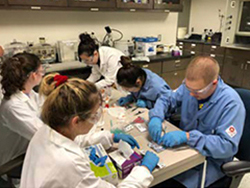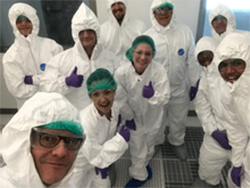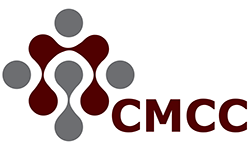

The field of mechanochemistry is transdisciplinary, not only in terms of the fundamental science—which requires training in surface chemistry and physics, materials science, and engineering—but also due to its societal and economic impacts. As such, the students trained in the CMCC will engage in highly collaborative team research projects, and further, will be exposed to topics ranging from entrepreneurship to science policy.
Our educational and professional development structure is designed to engage students across these areas, with the goal of establishing an active learning environment that we call a “Lab to Policy” approach. Students will be exposed to the full cycle of research (i.e. experiment, theory, science, economics, and policy/law) to establish clear connections to the convergent impact of their work. Our Phase 1 collaborations with national labs and industry will build toward student research internship opportunities with these partners in Phase 2. Workshops spanning entrepreneurship and policy on topics such as sustainability and green chemistry, and science policy internships, will bring their educational experience full circle.
The cross-cutting nature of mechanochemistry blends chemistry, materials science, engineering, and physics, and lends itself to a unique research experience for students. Our diverse team of faculty has a strong record of supporting integrative, interdisciplinary, collaborative research activities, and in fostering a supportive climate that welcomes students from a range of backgrounds, to boost the success of young researchers in STEM disciplines.
As the CMCC spans eleven institutions (Texas A&M University, University of California at Merced, University of Cincinnati, The Advanced Science Research Center of CUNY, Hunter College of CUNY, Massachusetts Institute of Technology, Northwestern University, University of Pennsylvania, Stanford University, Vanderbilt University, and College of William and Mary), participation in our REU program will not only allow students to gain experience in team-based research, but will also afford them the opportunity for professional development in science communications, entrepreneurship and innovation, STEM policy, and STEM history. Students in the CMCC REU will interact across our multi-institutional center via team based projects, and will receive personal mentoring from multiple faculty and graduate students. REU students will also participate in our summer Center retreat.
This international research experience begins with three weeks of onboarding activities, including hands-on training at the CMCC’s Mechanochemistry Innovation Hub at Texas A&M University, followed by seven weeks of research at the University of Birmingham (England) focused on fundamental mechanochemistry and manufacturing scale-up.
We are thrilled to partner with the Science History Institute to explore and educate on the history and modern practice of mechanochemistry.
Mechanochemistry dates back to antiquity, and is one of the oldest forms of carrying out chemical transformations. The application of force by the mechanical grinding and mixing of materials helps drive chemical reactions to create molecules and materials that often cannot be made easily through other means.
Recently, mechanochemistry is experiencing a renaissance due to the crucial need to develop greener and more sustainable methods for chemical synthesis.
This Google Arts & Culture exhibit, developed in partnership with the Science History Institute is the first of a series being developed to explore the historical origins of mechanochemistry, and to also give a sneak peek at the future of mechanochemistry. Exhibit Link
Check out the latest exhibit of the Google Arts & Culture series, developed in partnership with the Science History Institute.
Link to Distillations Magazine Article
by Melissa Rossi
by Anna Doel
The Soviet physical chemist discovered that a film of lubricant weakens the surfaces of materials, especially metals and rocks. This was an early example of the influence of mechanochemical effects.
A team of 16 members of the CMCC team from UPenn and CUNY were given a tour of the Science History Institute's Museum in Philadelphia by the Director of Museum Education, Dr. Lisa Berry Drago. Participants included faculty, postdocs, graduate students, REU students, and high school lab interns. The group learned about many aspects both the history and modern practice of science, including viewing a special exhibit on the science of textile colors, called BOLD: Color from Test Tube to Textile.
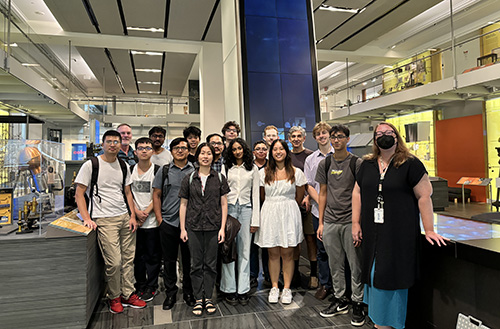
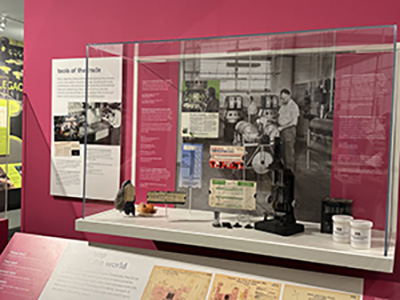

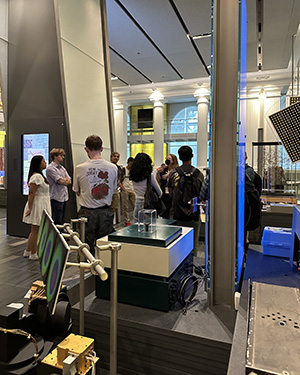
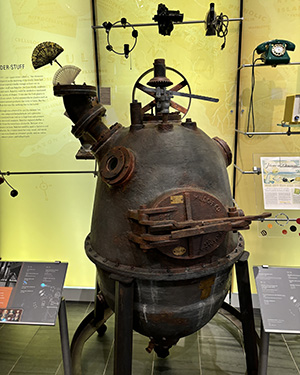
by Roger Turner
With help from the CMCC students, the Science History Institute digs into its collection of artifacts and finds multiple examples of mechanochemistry's underappreciated, but extensive history.
by Roger Turner and Clay Cansler
Building on these STEM Camp activities, we will expand the Youth Adventure Program (YAP) on Nanotechnology that Batteas initiated at TAMU in 2016. Integrated with TAMU’s existing YAP camp series, this program brings youth in middle and high schools from across the country to campus for one week to learn about a topical area.
